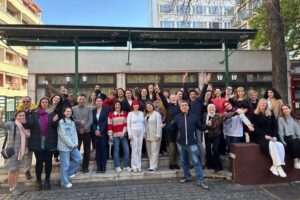The 14th edition of JUSTICE TRENDS Magazine has been released, offering a comprehensive exploration of how criminal justice systems are embracing innovation to strengthen rehabilitation. Produced by IPS/ICJS, the biannual publication brings together policy leaders, practitioners, and researchers to examine what it takes to turn decades of evidence into everyday action.
The editorial by Pedro das Neves opens with a challenge to the long-standing division between security and rehabilitation, arguing that true public safety depends on the two being pursued together. It frames innovation not just as new technology or novel programmes, but as the deliberate shift away from outdated, ineffective strategies towards approaches proven to create lasting change. The edition explores how jurisdictions are embedding research into routine operations, creating environments that support desistance, partnering with communities, and developing reliable ways to measure whether rehabilitation efforts are working.
The cover feature centres on Dr Salome Muhia-Beacco, Principal Secretary for Kenya’s State Department of Correctional Services, who outlines a reform agenda that combines infrastructure modernisation, expanded education and vocational training, digitalisation, and the increased use of non-custodial measures. She describes tangible outcomes such as the awarding of law degrees to serving inmates, the establishment of mental health counselling centres in nearly all prisons, and the development of a community probation volunteer programme to strengthen supervision and reintegration outside custody.
A standard feature of the magazine, the Expert’s Panel opens with a background article from Dr Frank Porporino, who draws on 50 years of experience in correctional psychology, research leadership, and international consultancy. Dr Porporino argues that evidence-informed practice is as much about stopping what does not work as it is about implementing proven strategies. He emphasises the importance of local research, careful adaptation of new practices to fit operational realities, and co-designing research agendas with practitioners and justice-involved individuals. His reflections highlight the persistent “implementation gap” in corrections and the need for a system-wide approach that includes families, communities, and institutions in the rehabilitation process.
The ensuing panel brings together research and practice including standout figures in the sector such as Theresa A. Gannon, Emily J. Salisbury, and Faye S. Taxman. The discussion examines how to design interventions grounded in sound theory, deliver them through qualified practitioners, and create environments that reinforce identity change. The conversation also considers how technology, gender-sensitive strategies, and cultural context can be integrated into rehabilitation efforts without undermining their integrity.
This issue also presents in-depth interviews with Dr James Bonta, co-author of The Psychology of Criminal Conduct who shares reflections on decades of research and why the Risk-Need-Responsivity model is still what works; Professor Fergus McNeill, Professor of Criminology & Social Work at the University of Glasgow, who discusses the social and cultural dimensions of rehabilitation and the importance of recognising the identities and relationships that support desistance; and Dr. Emma Regan, President of the International Association of Correctional and Forensic Psychology (IACFP), who speaks about the Association’s role in advancing professional development, fostering international collaboration, and promoting the exchange of research and practice insights across disciplines and borders.
Alongside these, the magazine includes a series of interviews with leaders from correctional administrations and rehabilitation supporting departments across Brazil, Canada, Czech Republic, Moldova, the Netherlands, New Zealand, Romania, Thailand, and Michigan, in the United States. These conversations reveal how different jurisdictions are applying innovation to address local challenges.

The Innovation in Practice section presents four case studies illustrating how diverse contexts are pushing the boundaries of rehabilitation support. In Michigan, the Vocational Villages initiative transforms correctional facilities into skilled trade training hubs, directly linking participants to employers upon release. In Belgium, detention houses offer a small-scale, community-integrated alternative to traditional prisons, providing a more personalised approach to custody and rehabilitation. Another innovation case features InterLIFT, a highly scalable treatment delivery model created to bridge the gap between rehabilitation ideals and institutional constraints. In Europe, the VR4React project introduces virtual reality as a tool for training reactive aggression management in prisons, helping participants practise responses to challenging situations in a safe, controlled environment.
The issue also includes a feature on Telio’s work in Namibia, demonstrating how secure, managed telephony can maintain vital family contact and support reintegration, and an article from MHS exploring the transformative role of digital tools in expanding access to correctional digital skills education. Together, these diverse perspectives show innovation in action across a wide spectrum of operational, technological, and cultural settings.
Across these pages, you’ll find these and other important discussions with contributions from 15 countries, providing both inspiration and a sober reminder of the challenges that remain in making rehabilitation not just a goal, but a working reality.
Read the full edition now: www.justice-trends.press








